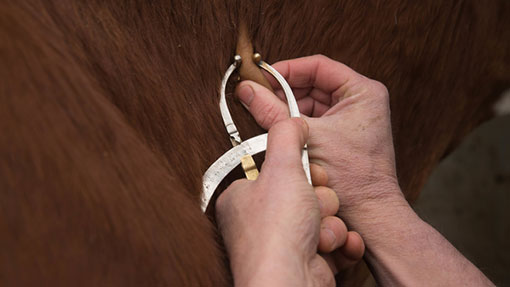Check TB risk before buying livestock to cut breakdowns

Farmers are being encouraged to ask about the TB status of the animals they are buying to protect their herds against a breakdown.
This practice, known as risk-based trading (RBT), will give farmers vital information about the animals they are buying and help them to assess and manage the risk of their herds being infected with bovine TB.
And Defra says farmers in areas classed as low-risk for bovine TB, such as the north and east of England, can reduce the risk of their herds being infected if they request information on the TB history of cattle they buy.
See also: Farmers press for new TB test trial in cattle
“Providing and receiving this extra information will help farmers to minimise the possibility of a TB breakdown with all its tragic knock-on effects – such as having their herd placed under restrictions and the high likelihood that all nearby herds are also subjected to multiple TB tests.”
Michael Seals, Animal Health and Welfare Board for England
Since the launch of RBT last November, Defra has provided posters and guidance leaflets to all auction marts in England explaining the importance of the practice and what this means for farmers.
Before farmers buy stock to add to their herd they should find out each animal’s TB history, asking sellers as a minimum for:
- The date of the animal’s last pre-movement test, if applicable
- The date of the last routine herd test
- If the herd has ever had TB and, if it has, when it last came off restrictions.
Farm minister George Eustice said: “Introducing new animals to a herd can be a potential disease risk.
“Farms in the north and east of England are for the most part free of bovine TB and we want to do everything we can to prevent the spread of disease to these parts of the country.
“RBT will help us do just that. It is an important tool that gives farmers the ability to reduce the risk to their livelihoods from the threat of this terrible disease, which can have a devastating impact on farms and lead to the slaughter of otherwise healthy cattle.”
Michael Seals, chairman of the Animal Health and Welfare Board for England added: “Providing and receiving this extra information will help farmers to minimise the possibility of a TB breakdown with all its tragic knock-on effects – such as having their herd placed under restrictions and the high likelihood that all nearby herds are also subjected to multiple TB tests.
“Farmers owe it to themselves and their neighbours to adopt RBT. It is a common sense step which can make a big impact on stopping the spread of bovine TB, and I urge all farmers to take it on board.”
